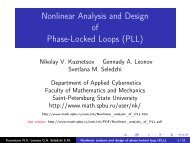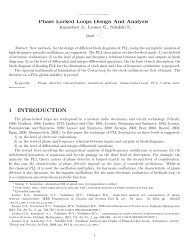Technical Sessions – Monday July 11
Technical Sessions – Monday July 11
Technical Sessions – Monday July 11
You also want an ePaper? Increase the reach of your titles
YUMPU automatically turns print PDFs into web optimized ePapers that Google loves.
TA-19 IFORS 20<strong>11</strong> - Melbourne<br />
� TA-19<br />
Tuesday, 9:00-10:30<br />
Meeting Room 216<br />
Attracting and Retaining Students in OR<br />
Programs<br />
Stream: Education and Operations Research<br />
Invited session<br />
Chair: Maseka Lesaoana, Statistics and Operations Research Dept.,<br />
University of Limpopo, Private Bag X<strong>11</strong>06, Sovenga, 0727,<br />
Polokwane, Limpopo Province, South Africa,<br />
maseka.lesaoana@ul.ac.za<br />
1 - OR in High Schools — New MINDSET for Teaching<br />
Mathematics<br />
Kenneth Chelst, Industrial and Manufacturing Engineering,<br />
Wayne State University, 4815 Fourth St., Room #2149, 48202,<br />
Detroit, MI, United States, kchelst@wayne.edu, Thomas<br />
Edwards<br />
Project MINDSET has developed and implemented a full year high school<br />
mathematics curriculum based on OR. The curriculum and textbook are being<br />
piloted in several dozen high school classrooms. We explore how this curriculum<br />
requires a fundamentally different mindset for teaching math in high<br />
schools. It presents mathematics in real-world contexts to explore and discuss<br />
the robustness of decisions. It de-emphasizes the idea of finding the single right<br />
answer that is the core of traditional mathematics. We present a summary of<br />
the experiences of the first 1,000 students and their teachers.<br />
2 - Operations Research at Historically Disadvantaged Institutions<br />
in South Africa with reference to the University<br />
of Limpopo<br />
Maseka Lesaoana, Statistics and Operations Research Dept.,<br />
University of Limpopo, Private Bag X<strong>11</strong>06, Sovenga, 0727,<br />
Polokwane, Limpopo Province, South Africa,<br />
maseka.lesaoana@ul.ac.za<br />
In South Africa the development of OR and its applications have remained<br />
dominant among the "historically advantaged institutions". The aim of this paper<br />
is to establish reasons why the "historically disadvantaged institutions" in<br />
South Africa are invisible in the OR field. The most important recommendation<br />
made is collaborative programmes in OR across the country and beyond that<br />
will enable easy movement between universities.<br />
� TA-20<br />
Tuesday, 9:00-10:30<br />
Meeting Room 217<br />
Soft OR IV<br />
Stream: Soft OR and Problem Structuring<br />
Invited session<br />
Chair: John Yearwood, School of InformationTechnology and<br />
Mathematical Sciences, University of Ballarat, Univerity Drive,<br />
Mount Helen, P.O. Box 663, 3353, Ballarat, Victoria, Australia,<br />
j.yearwood@ballarat.edu.au<br />
1 - The Evolution of Knowledge Representations over the<br />
Course of an Operations Research Study<br />
Cherylne Fleming, DSTO, 2600, Canberra, Australia,<br />
cherylne.fleming@dsto.defence.gov.au, Lydia Byrne<br />
An Operations Research (OR) study goes through a number of stages in its<br />
life-time. This evolution can be likened to the development knowledge in a<br />
scientific domain following the discovery of a new phenomenon. Such developments<br />
have long been accomplished through the use of representations of<br />
information and data that evolve in type and content as understanding of the<br />
phenomena develops. This paper argues that, like scientific studies of new phenomena,<br />
OR studies should leverage the science of knowledge representation<br />
development to construct tailored knowledge representations that evolve as the<br />
study progresses.<br />
38<br />
2 - An Approach to the Decomposition of Large-scale<br />
Stochastic Scheduling Problems<br />
Geoff Robinson, Mathematics, Informatics and Statistics,<br />
CSIRO, 3168, Melbourne, VIC, Australia,<br />
Geoff.Robinson@csiro.au, Andreas Ernst, Gaurav Singh<br />
We consider problems that arise in scheduling of various activities in the entire<br />
coal industry of Bowen Basin. This includes scheduling of trains, stackers,<br />
reclaimers and ships. We also assume that the duration of these activities is<br />
stochastic. We present an approach to decomposing such problems into subproblems<br />
based on a single computational procedure for evaluation of plans.<br />
Options (such as the order of berthing ships at a wharf) for decision variables<br />
can be evaluated by fleshing them out into detailed plans and then evaluating<br />
those detailed plans.<br />
3 - Features of Aggregation Feedback for Individuals Engaged<br />
in Problem Solving within a Reasoning Community<br />
John Yearwood, School of InformationTechnology and<br />
Mathematical Sciences, University of Ballarat, Univerity Drive,<br />
Mount Helen, P.O. Box 663, 3353, Ballarat, Victoria, Australia,<br />
j.yearwood@ballarat.edu.au, Andrew Stranieri<br />
Reasoning for most practical problem solving involves communicative exchanges<br />
of assertions within participants in a community we call a reasoning<br />
community. The feedback individuals in a reasoning community receive can<br />
include forms of aggregation of individual views ranging from numerical preference<br />
schemes to structured representations such as argument schemes. We<br />
draw on reasoning communities in water management and law to illustrate that<br />
the type of aggregation that enhances reasoning depends on features of the community<br />
including the decision making and communication protocols adopted.<br />
� TA-21<br />
Tuesday, 9:00-10:30<br />
Meeting Room 218<br />
Airline Scheduling<br />
Stream: Airline Applications<br />
Invited session<br />
Chair: Francois Soumis, GERAD, 3000 Cote Ste-Catherine, H3T<br />
2A7, Montreal, Québec, Canada, francois.soumis@gerad.ca<br />
1 - Introducing Competition in Airline Schedule Development<br />
Luis Cadarso, Matemática Aplicada y Estadística, Universidad<br />
Politécnica de Madrid, Pz. Cardenal Cisneros, 3, 28040, Madrid,<br />
Spain, luis.cadarso@upm.es, Ángel Marín<br />
The airline schedule design and fleet assignment problems consist of determining<br />
departure time and fleet type for each flight. We propose an integrated<br />
approach to design flight legs accounting for fleet assignment and market competition,<br />
providing robust itineraries. As we are designing the timetable, we<br />
focus on providing smooth connections to passengers so as to avoid misconnections.<br />
The introduction of competition leads us to a mixed integer nonlinear<br />
program. We solve it using Taylor’s series approach to the competition. An<br />
application of the model for IBERIA’s network is shown.<br />
2 - Using Network Optimisation to Solve a Vehicle Scheduling<br />
Problem<br />
Juan José Salazar González, Estadística e Investigación<br />
Operativa, Universidad de La Laguna (Tenerife), Av. Astrofísico<br />
Francisco Sánchez, s/n, Facultad de Matemáticas, 38271, La<br />
Laguna, Tenerife, Spain, jjsalaza@ull.es<br />
"Binter Canarias" is a private regional air transport group with 19 aircrafts ATR<br />
72 and more than 1000 employees flying close to 150 daily flights on average.<br />
The airline operates in eight Canary airports and supports routes with Northern<br />
Africa and Madeira. The operations management is critical to the business<br />
because Binter Canarias operates very short flights of 30 minutes flight time<br />
on average. In this paper we present, model and solve the vehicle-and-crew<br />
schedulling problem of the airline through network optimisation techniques.




